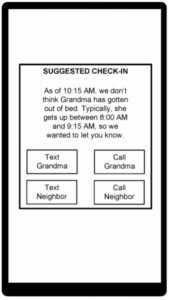Google has been pushing the smart home for a few years now, starting with the launch of Google Home smart speaker in 2016. Having consolidated its smart home devices under the Nest ecosystem, Google is eyeing features tailored to specific types of residents.
A new U.S. patent details functionality designed for elderly people, and aimed at giving their loved ones peace of mind.
Google lays out a method for “thoughtful elderly monitoring.” Specifically, accurate and convenient ways for people to check in with their elderly, enabled by items that are part of the Internet of Things, or IoT. These interconnected machines are the key to providing a fairly accurate picture of what a smart home resident is up to, and whether they are in need of assistance.
Google says the system would be a way around the tendency of adult children to check on their elderly parents who live alone at random times or only when convenient. Using smart home monitoring, adult children can get a rundown on their parent’s status without having to frequently make phone calls or send emails.
Besides obvious data-gatherers like smart speakers and cameras, Nest devices range from the doorbell to the smoke alarm to the thermostat. Google suggests this collective of IoT devices can learn and analyze an elderly individual’s typical activities or routine over a trial period. Deviations from this “ordinary behavior model,” such as worrisome or erratic behavior due to a physical or mental condition, may trigger an alert for the person linked to the smart home.
One caveat is that the system requires enough IoT devices to be present around the house, to sufficiently monitor the elderly resident. But given the rising popularity of smart devices, with a market set to grow to $6.5 billion by 2026, smart home residents may not have to go too far out of their way to avail of Google’s elderly monitoring system, if it ever gets implemented.






